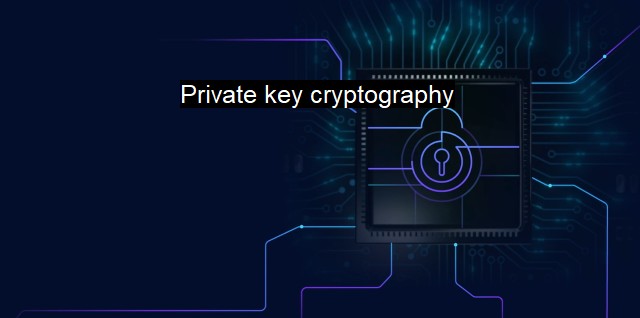What is Private key cryptography?
Private Key Cryptography: An Introduction to Asymmetric Encryption for Cybersecurity Defense and Secure Communications
Private Key Cryptography, also known as symmetric cryptography, is a fundamental concept in the field of cybersecurity and one of the primary methods used to protect information from unauthorized access or potential hackers. It represents the utilization of a single, master key to both encrypt and decrypt data. This so-called private key is held exclusively by the participant or sender and their designated receiver to enable secure communication.The process for Private Key Cryptography is relatively straightforward. Suppose Alice wants to send Bob a confidential message. She would compose the message and then harness the encryption algorithm based on a mutually agreed private key. Once encrypted, the message changes to an unreadable text format, commonly referred to as ciphertext, which protects the original content from unauthorized users. When Bob receives this ciphertext, he applies the same private key to decrypt it, translating it back to its original format or plaintext.
The most notable example of such a system is the Advanced Encryption Standard (AES). This method predominantly secures sensitive information due to its impenetrability and fast operation speed. Irrespective of having the ciphertext, unauthorized users are unable to decode the information unless they possess the correct private key.
Unfortunately, there is a major constraint within Private Key Cryptography. Sharing the private key across insecure routes presents substantial security risks. Should the key fall into the wrong hands, ill-intentioned individuals could decode all intercepted messages that the key encrypted. Consequently, securing this private key is a challenge that needs to be handled with caution. This issue forms the backdrop to widespread preference among some for Public Key Cryptography or asymmetric cryptography, which utilizes two separate keys for encryption and decryption.
Despite this perceived weakness, modern cybersecurity applications nevertheless widely employ Private Key Cryptography. Most antivirus software uses it to encrypt communications between your systems and the security provider's servers, so intruders cannot eavesdrop on your interactions. encrypted files and data, including archived and compressed forms of data, are also propagated using symmetric cryptography to ensure their safety.
Extended usage for this encryption methodology involves elements beyond antivirus communication. When utilizing secure online banking, transmitting cardholder data, or conducting any other sort of sensitive transaction over the internet, it's symmetrical or Private Key Cryptography that provides the baseline for security. Any breach or security issue corresponds directly with the failure or compromise of the private key used, rendering the data exposed.
VPN (Virtual Private Networks) services are another example of security networks that vastly utilize Private Key Cryptography. Virtual Tunneling Protocols use this encryption method to create secure “tunnels” for data passage across the internet. It allows businesses and individuals to protect the confidentiality and integrity of the data they transmit over the network.
Despite the challenges with key distribution, Private Key Cryptography remains one of the most effective and frequently used methods for securing data. It enables users to retain control over their keys and reduce their information's vulnerability. Its staying power as a robust tool for ensuring secure communication lays in its simplicity, effectiveness, and the speed of its operations. As cybersecurity problems continue to evolve at pace with technological developments, Private Key Cryptography will remain an indispensable technique for mitigating threats and securing valuable information.

Private key cryptography FAQs
What is private key cryptography?
Private key cryptography is a type of encryption that uses a single private key for both encryption and decryption of data. It is also known as symmetric-key cryptography.How does private key cryptography ensure cybersecurity?
Private key cryptography ensures cybersecurity by ensuring that only authorized individuals with access to the private key can decrypt and access sensitive information. This makes it difficult for hackers to intercept the information and use it for malicious purposes.What is the difference between private key cryptography and public key cryptography?
The main difference between private key cryptography and public key cryptography is that private key cryptography uses a single private key for both encryption and decryption, while public key cryptography uses a pair of public and private keys for encryption and decryption, respectively.Can antivirus software protect private keys?
Antivirus software can protect private keys by preventing malware and other malicious programs from accessing them. It can also detect and remove any malware that has already infected the system, thereby ensuring that the private keys remain secure. However, it is important to note that antivirus software is not a foolproof solution and other security measures, such as encryption and access control, should also be implemented to ensure maximum protection of private keys.| | A | | | B | | | C | | | D | | | E | | | F | | | G | | | H | | | I | | | J | | | K | | | L | | | M | |
| | N | | | O | | | P | | | Q | | | R | | | S | | | T | | | U | | | V | | | W | | | X | | | Y | | | Z | |
| | 1 | | | 2 | | | 3 | | | 4 | | | 7 | | | 8 | | |||||||